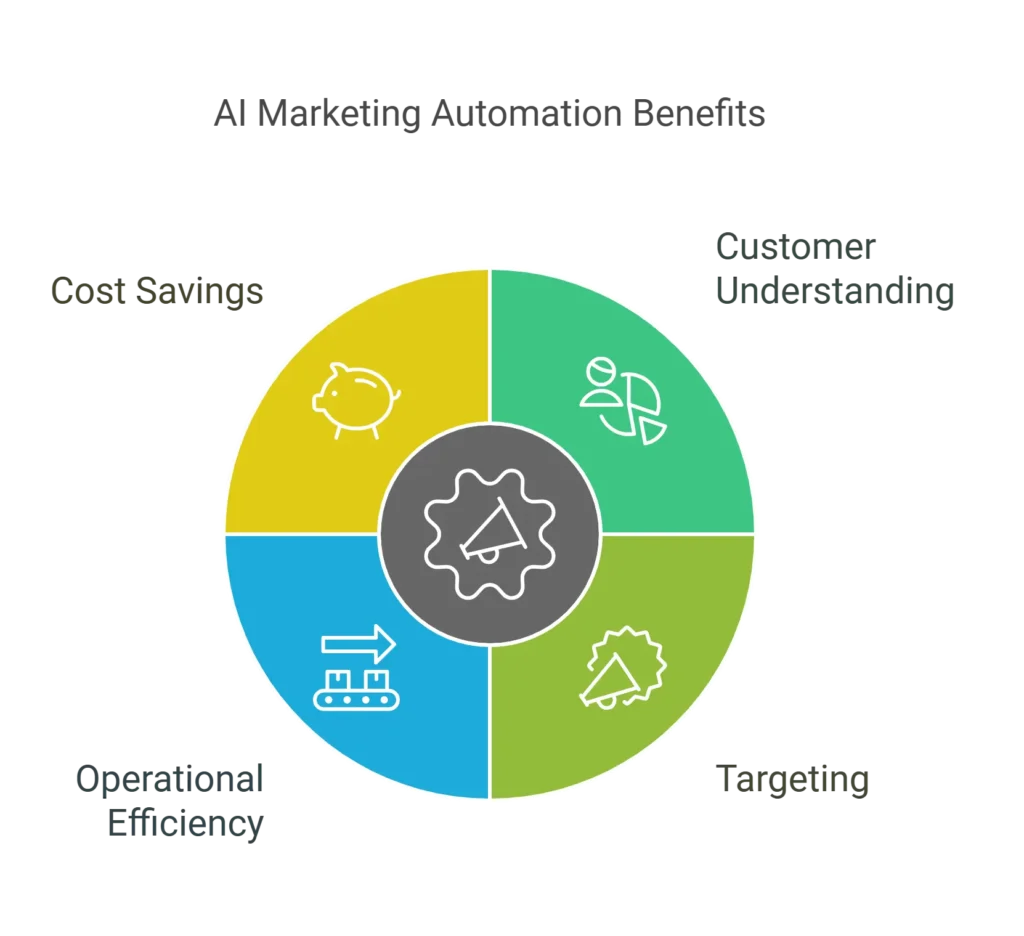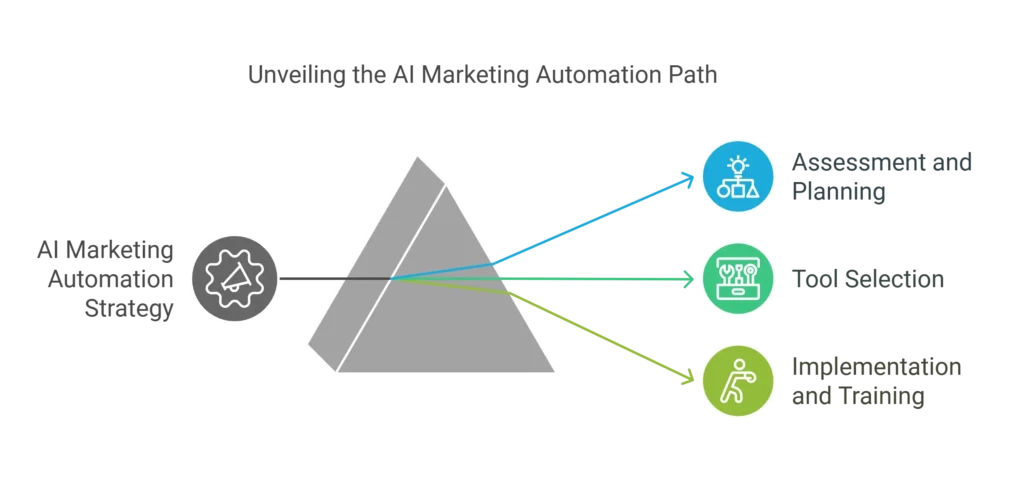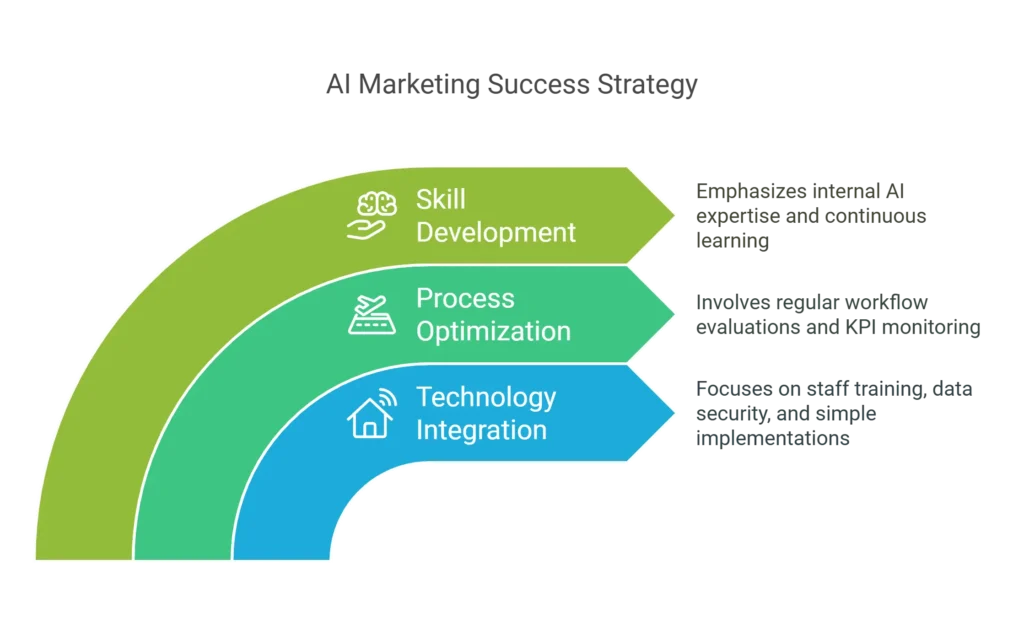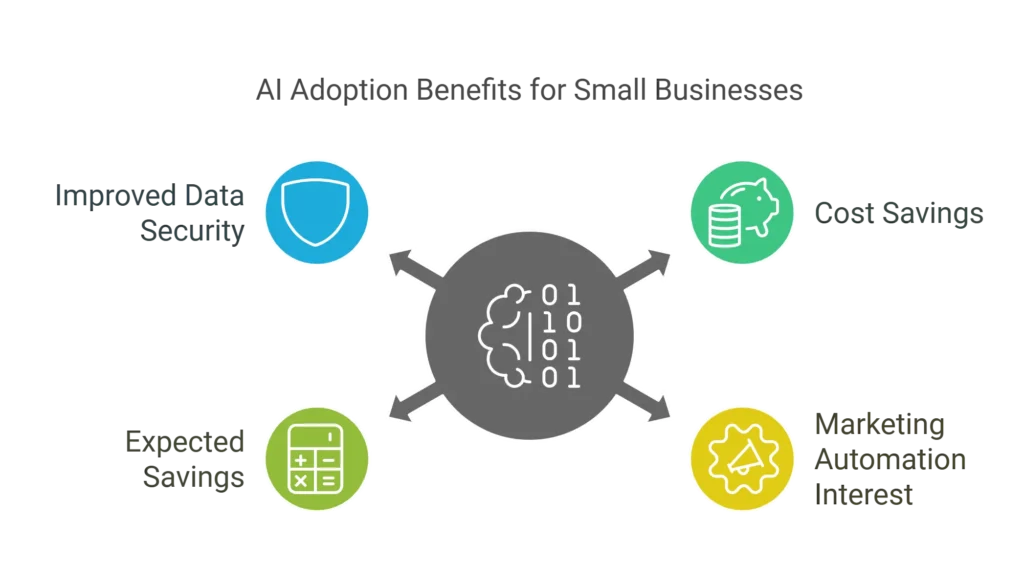AI Marketing Automation for Small Business: 2025 Guide
AI marketing automation for small business has become a critical differentiator, enabling companies to compete effectively while maximizing limited resources.
According to a groundbreaking report from SBE Council, small businesses are collectively saving $273.5 billion annually through AI adoption. Yet, many business owners still struggle to navigate the complex landscape of AI marketing automation. What opportunities await small businesses willing to embrace this technology, and what challenges must they overcome to succeed in 2025?
As artificial intelligence continues to reshape the marketing landscape, small businesses stand at a crucial crossroads. While enterprise-level companies forge ahead with sophisticated AI implementations, small businesses face unique opportunities and obstacles in adopting these powerful tools. This comprehensive guide explores how small businesses can effectively leverage AI marketing automation while managing its challenges in 2025.
Key Takeaways:
- AI Adoption Saves Billions: Small businesses collectively save $273.5 billion annually through AI marketing automation, enhancing efficiency and reducing costs.
- Rising Interest in AI: 74% of small businesses express interest in AI adoption, with 28% expecting to save over $5,000 annually.
- Key Market Trends for 2025: AI democratization, predictive analytics, and personalization are driving significant growth and improved customer engagement.
- Opportunities for Small Businesses: AI enables better customer targeting, operational efficiency, and cost savings, making it a game-changer for scaling small businesses.
- Challenges to Overcome: Technical expertise gaps, cost concerns, and data security remain key hurdles. Solutions include training, phased implementation, and robust data practices.
- Proven Success in Case Studies: Real-world examples like VoiceSpin and LitSlink demonstrate the effectiveness of AI in improving customer satisfaction, campaign performance, and cost reduction.
- Future Trends to Watch: Voice and visual search, advanced predictive analytics, and natural language processing will shape AI marketing automation by 2025.
- Practical Implementation Strategy: Start with assessment, choose scalable tools, train staff effectively, and monitor results for continuous improvement.
- Regulatory Compliance: Small businesses must prioritize data security, comply with privacy laws, and regularly audit their practices to avoid risks.
- Actionable Recommendations: Focus on areas with immediate ROI, leverage scalable tools, and invest in staff training to maximize AI benefits.
The Current State of AI Marketing Automation for Small Businesses
The marketing automation landscape has evolved dramatically, with AI becoming increasingly accessible to smaller organizations. According to recent research from Marketing Profs, 74% of small businesses now express interest in using AI or automation, marking a significant shift from previous years. This transformation is driven by more affordable solutions, user-friendly interfaces, and growing competitive pressures.
Streamline your marketing efforts today! Try HubSpot Marketing Hub for free and experience how automation can transform your strategy.”
Key Market Trends Shaping 2025
Several critical trends are defining the AI marketing automation landscape for small businesses:

- Democratization of AI Tools: Research from Statista indicates that 30% of small businesses plan to invest in AI marketing tools in 2025, up from 22% in 2024.
- Integration of Predictive Analytics: According to MDPI Journal’s research, businesses utilizing AI saw a 25% increase in customer acquisition rates.
- Personalization at Scale: A study published on ResearchGate shows that AI-driven marketing automation can enhance customer engagement by up to 30%.
Case Study: Successful AI Implementation in Small Business Marketing
The VoiceSpin Study
VoiceSpin’s comprehensive analysis of small business AI adoption revealed remarkable results:
Key Findings:
- 91% of small businesses using AI reported increased success
- 60% experienced significant time savings
- 33% saved more than 40 minutes per week on marketing tasks
See how VoiceSpin transforms customer interactions. Schedule a demo to unlock your business’s potential!
Opportunities in AI Marketing Automation

Enhanced Customer Understanding and Targeting
According to Filestage’s research, AI marketing automation offers unprecedented opportunities for small businesses to understand and target their customers effectively. Advanced analytics and machine learning algorithms can:
- Process vast amounts of customer data to identify patterns and preferences
- Create detailed customer segments for targeted marketing campaigns
- Predict customer behavior and lifetime value
- Optimize marketing spend based on customer engagement patterns
Operational Efficiency and Cost Savings
Research published in the Scientific Research Publishing Journal reveals that 28% of small businesses expect to save at least $5,000 annually through AI automation. These savings come from:
- Automated email marketing campaigns and social media management
- Streamlined customer service through AI chatbots
- Optimized ad spending through machine learning algorithms
- Reduced manual data analysis and reporting time
Discover how ActiveCampaign can drive better targeting and engagement for your business. Start your free trial now!
Real-World Implementation Case Study
LitSlink’s Small Business AI Integration Study
LitSlink’s comprehensive analysis documented the following results:
Key Metrics:
- 76% of businesses reported improved customer satisfaction
- 82% achieved better marketing campaign performance
- Cost reduction of 30% in customer service operations
Challenges and Solutions
Implementation Barriers

Many small businesses face significant hurdles when implementing AI marketing automation:
Challenge: Technical Expertise Gap
Solution: Partner with AI marketing automation providers offering comprehensive onboarding and training programs. Start with basic implementations and gradually expand capabilities as team expertise grows.
Challenge: Cost Concerns
Solution: Begin with core functionalities that deliver immediate ROI, such as email automation and social media management. Utilize scalable pricing models that grow with your business.
Data Security and Privacy
Data security remains a primary concern, with 44% of small businesses citing it as their main worry regarding AI adoption.
Best Practices for Data Security:

- Implement robust data encryption protocols
- Regularly audit data collection and storage practices
- Ensure compliance with privacy regulations like GDPR and CCPA
- Train staff on data security best practices
Case Study: Data Security Implementation Success
Research from Global Trade Magazine shows:
Key Findings:
- 85% of small businesses improved their data security after implementing AI tools
- 72% reported better compliance with privacy regulations
- 63% experienced fewer security incidents
Practical Implementation Strategy

Step 1: Assessment and Planning
- Evaluate current marketing processes and identify automation opportunities
- Set clear objectives and KPIs
- Assess available resources and budget constraints
- Create a phased implementation timeline
Step 2: Tool Selection
- Research available AI marketing automation platforms
- Compare features, pricing, and integration capabilities
- Consider scalability and future needs
- Evaluate vendor support and training resources
Step 3: Implementation and Training
- Start with pilot programs in key areas
- Provide comprehensive staff training
- Monitor early results and adjust as needed
- Gradually expand to additional marketing functions
Learn how AI marketing automation is revolutionizing personalized customer experiences in 2025. Discover the ultimate guide!
Future Outlook and Recommendations
Emerging Trends for 2025
Recent research from Constant Contact indicates several key trends:

Increased Integration of Voice and Visual Search
- 73% of businesses plan to implement voice search optimization
- 68% will invest in visual search capabilities
Advanced Predictive Analytics Capabilities
- 82% expect to use predictive analytics for customer behavior
- 76% plan to implement predictive pricing models
Enhanced Natural Language Processing
- 85% will utilize NLP for customer service
- 79% plan to implement conversational marketing
Stay ahead of the curve with the latest AI marketing automation trends shaping 2025. Click here to explore!
Strategic Recommendations
To maximize success with AI marketing automation in 2025, small businesses should:

Technology Integration
- Invest in comprehensive staff training programs
- Focus on data quality and security
- Start with high-impact, low-complexity implementations
Process Optimization
- Regularly evaluate automation workflows
- Monitor KPIs and adjust strategies
- Maintain focus on customer experience
Skill Development
- Develop internal AI expertise
- Create cross-functional teams
- Establish continuous learning programs
Market Analysis Case Study
The U.S. Census Bureau’s analysis of AI adoption trends reveals:
Key Statistics:
- 74% of small businesses plan to increase AI investment in 2025
- 68% expect significant ROI within the first year
- 82% believe AI will be crucial for competitive advantage
Conclusion
AI marketing automation presents transformative opportunities for small businesses in 2025. While challenges exist, particularly around implementation and data security, the potential benefits far outweigh the risks. By taking a strategic, measured approach to adoption and focusing on practical solutions, small businesses can successfully leverage AI marketing automation to drive growth and compete effectively in an increasingly digital marketplace.
Key Takeaways:

- AI adoption saves small businesses collectively $273.5 billion annually
- 74% of small businesses show interest in AI marketing automation
- 28% expect to save at least $5,000 annually through implementation
- 85% report improved data security after AI implementation
Discover the top challenges businesses face with AI marketing automation in 2025 and how to overcome them. Read more now!
FAQ: AI Marketing Automation for Small Businesses: Opportunities and Challenges in 2025
What are the key benefits of AI marketing automation for small businesses?
Answer: AI marketing automation significantly enhances efficiency and growth for small businesses by saving time, reducing errors, and improving customer engagement.
Detailed Explanation: According to a recent survey of 486 small business owners, 60% reported that AI and automation have helped them save time and work more efficiently. Additionally, 91% of those using these technologies indicated that they have made their businesses more successful. The market for AI in marketing is projected to grow from $22.01 billion in 2023 to $28.37 billion in 2024, reflecting a compound annual growth rate (CAGR) of 28.9%[1][4]. These statistics underscore the transformative potential of AI in streamlining marketing processes and enhancing customer interactions.
Source:
- Constant Contact & Ascend2 report (August 2023): https://news.constantcontact.com/small-business-now-ai-2023
- The Business Research Company (December 2022): https://www.thebusinessresearchcompany.com/report/artificial-intelligence-in-marketing-global-market-report
What challenges do small businesses face when implementing AI marketing automation?
Answer: Small businesses often encounter challenges such as data security concerns, high costs, and a lack of understanding regarding AI technologies.
Detailed Explanation: A survey indicated that while 74% of small businesses are interested in using AI or automation, many express concerns about data security (reported by 44% of respondents) and the associated costs. Moreover, only 26% are currently utilizing these technologies, suggesting a gap between interest and implementation[2][5]. This highlights the need for education and support in navigating the complexities of AI marketing tools.
Source:
- Constant Contact & Ascend2 report (August 2023): https://news.constantcontact.com/small-business-now-ai-2023
- Loopex Digital report (December 2024): https://www.loopexdigital.com/blog/ai-marketing-statistics
How is the market for AI marketing automation expected to evolve by 2025?
Answer: The market for AI marketing automation is expected to continue its rapid growth, driven by increasing adoption across various sectors and advancements in technology.
Detailed Explanation: The global market size for AI in marketing is projected to reach approximately $80.3 billion by 2028, growing at a CAGR of 29.7%. This growth is attributed to factors such as enhanced personalization strategies and advanced predictive analytics capabilities[4][5]. By 2025, small businesses will likely see even greater integration of AI tools into their marketing strategies as these technologies become more accessible and affordable.
Source:
- The Business Research Company (December 2022): https://www.thebusinessresearchcompany.com/report/artificial-intelligence-in-marketing-global-market-report
- Loopex Digital report (December 2024): https://www.loopexdigital.com/blog/ai-marketing-statistics
What are the emerging trends in AI marketing automation for small businesses?
Answer: Key trends include the rise of personalized content, increased use of chatbots, and enhanced data analytics capabilities.
Detailed Explanation: As businesses increasingly adopt AI technologies, personalized marketing strategies are becoming essential. A significant portion of small business owners (73%) reported using generative AI tools like chatbots to enhance customer interactions. Furthermore, the ability to analyze vast amounts of data allows businesses to tailor their marketing efforts more effectively[3]. These trends indicate a shift towards more sophisticated and customer-centric marketing approaches.
Source:
- DigitalOcean article (October 2023): https://www.digitalocean.com/resources/articles/ai-marketing
- Markivis blog post (May 2023): https://www.markivis.com/4-important-marketing-automation-trends/
How can small businesses ensure compliance with regulations when using AI marketing tools?
Answer: Small businesses should stay informed about relevant regulations and implement best practices for data privacy and security.
Detailed Explanation: With increasing scrutiny on data usage and privacy laws such as GDPR and CCPA, it is crucial for small businesses to understand their legal obligations when utilizing AI tools. Regular training on compliance issues and adopting transparent data practices can help mitigate risks associated with non-compliance. Additionally, consulting with legal experts familiar with digital marketing regulations can provide further guidance[2].
Source:
- Constant Contact & Ascend2 report (August 2023): https://news.constantcontact.com/small-business-now-ai-2023
- Markivis blog post (May 2023): https://www.markivis.com/4-important-marketing-automation-trends/
What actionable steps can small businesses take to leverage AI marketing automation effectively?
Answer: Small businesses should start by identifying specific areas where AI can improve efficiency, invest in training for staff, and choose user-friendly tools.
Detailed Explanation: To maximize the benefits of AI marketing automation, small businesses should:
- Identify Key Areas for Improvement: Focus on tasks that consume significant time or resources.
- Invest in Training: Equip staff with the necessary skills to utilize AI tools effectively.
- Select User-Friendly Tools: Choose platforms that integrate easily with existing systems to minimize disruption.
By taking these steps, small businesses can enhance their marketing strategies while ensuring they remain competitive in an evolving digital landscape[1][2].
Source:
- Constant Contact & Ascend2 report (August 2023): https://news.constantcontact.com/small-business-now-ai-2023
- DigitalOcean article (October 2023): https://www.digitalocean.com/resources/articles/ai-marketing
Looking to take your SaaS business to the next level? Explore proven affiliate marketing strategies tailored for 2025 success. Don’t miss out, check it out here




